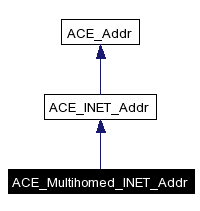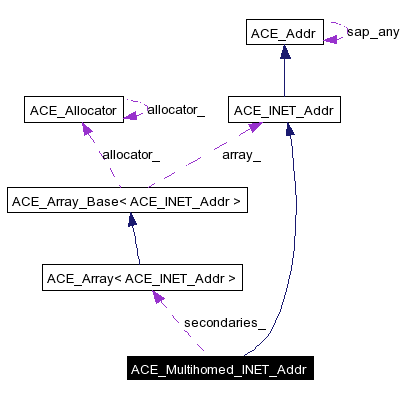
#include <Multihomed_INET_Addr.h>
Inheritance diagram for ACE_Multihomed_INET_Addr:


Public Member Functions | |
| ACE_Multihomed_INET_Addr (void) | |
| Default constructor. | |
| ACE_Multihomed_INET_Addr (const char address[]) | |
| ACE_Multihomed_INET_Addr (u_short port_number, const char primary_host_name[], int encode=1, int address_family=AF_UNSPEC, const char *(secondary_host_names[])=0, size_t size=0) | |
| ACE_Multihomed_INET_Addr (u_short port_number, ACE_UINT32 primary_ip_addr=INADDR_ANY, int encode=1, const ACE_UINT32 *secondary_ip_addrs=0, size_t size=0) | |
| ACE_Multihomed_INET_Addr (u_short port_number, const wchar_t primary_host_name[], int encode=1, int address_family=AF_UNSPEC, const wchar_t *(secondary_host_names[])=0, size_t size=0) | |
| int | set (u_short port_number, const wchar_t primary_host_name[], int encode=1, int address_family=AF_UNSPEC, const wchar_t *(secondary_host_names[])=0, size_t size=0) |
| ~ACE_Multihomed_INET_Addr (void) | |
| Use compiler-generated copy constructor. Use compiler-generated assignment operator. Default dtor. | |
| int | set (u_short port_number, const char primary_host_name[], int encode=1, int address_family=AF_UNSPEC, const char *(secondary_host_names[])=0, size_t size=0) |
| int | set (u_short port_number, ACE_UINT32 primary_ip_addr=INADDR_ANY, int encode=1, const ACE_UINT32 *secondary_ip_addrs=0, size_t size=0) |
| void | set_port_number (u_short, int encode=1) |
| size_t | get_num_secondary_addresses () const |
| int | get_secondary_addresses (ACE_INET_Addr *secondary_addrs, size_t size) const |
| void | get_addresses (sockaddr_in *addrs, size_t size) const |
| void | get_addresses (sockaddr_in6 *addrs, size_t size) const |
| IPV6 version of the above. | |
Private Attributes | |
| ACE_Array< ACE_INET_Addr > | secondaries_ |
|
|
Default constructor.
|
|
|
Initializes an <ace_multihomed_inet_addr> from the <address>, which can be "ip-number:port-number" (e.g., "tango.cs.wustl.edu:1234" or "128.252.166.57:1234"). If there is no ':' in the <address> it is assumed to be a port number, with the IP address being INADDR_ANY. |
|
||||||||||||||||||||||||||||
|
Constructs an <ace_multihomed_inet_addr> from a <port_number>, a <primary_host_name>, and an array of <secondary_host_names>. <size> is taken to be the length of the array. If <encode> is non-zero, then <port_number> is converted into network byte order; otherwise it is assumed to be in network byte order already and is passed straight through. <address_family> can be used to select IPv4/IPv6 if the OS has IPv6 capability (ACE_HAS_IPV6 is defined). To specify IPv6, use the value AF_INET6. To specify IPv4, use AF_INET. |
|
||||||||||||||||||||||||
|
Constructs an <ace_multihomed_inet_addr> from a port_number, a primary_ip_addr, and an array of secondary_ip_addrs. size is taken to be the length of the array. If encode is non-zero, then the port number and the IP addresses are converted into network byte order; otherwise they are assumed to be in network byte order already and are passed straight through. |
|
||||||||||||||||||||||||||||
|
WCHAR versions of the methods that take char's as arguments. |
|
|
Use compiler-generated copy constructor. Use compiler-generated assignment operator. Default dtor.
|
|
||||||||||||
|
IPV6 version of the above.
|
|
||||||||||||
|
Initialize user-supplied array <addrs> with the the current primary and secondary addresses. <size> is taken as the size of this array. |
|
|
Returns the number of secondary addresses. |
|
||||||||||||
|
Initialize user-supplied array <secondary_addrs> with the current secondary addresses. <size> is taken as the size of this array. |
|
||||||||||||||||||||||||
|
Initializes an <ace_multihomed_inet_addr> from a port_number, a primary_ip_addr, and an array of secondary_ip_addrs. size is taken to be the length of the array. If encode is non-zero, then the port number and the IP addresses are converted into network byte order; otherwise they are assumed to be in network byte order already and are passed straight through. |
|
||||||||||||||||||||||||||||
|
Initializes an <ace_multihomed_inet_addr> from a <port_number>, a <primary_host_name>, and an array of <secondary_host_names>. <size> is taken to be the length of the array. If <encode> is non-zero, then <port_number> is converted into network byte order; otherwise it is assumed to be in network byte order already and is passed straight through. <address_family> can be used to select IPv4/IPv6 if the OS has IPv6 capability (ACE_HAS_IPV6 is defined). To specify IPv6, use the value AF_INET6. To specify IPv4, use AF_INET. |
|
||||||||||||||||||||||||||||
|
|
|
||||||||||||
|
Sets the port number without affecting the host name. The port numbers of the primary address, and of any and all secondary addresses, are affected. If <encode> is enabled, then <port_number> is converted into network byte order, otherwise it is assumed to be in network byte order already and is passed straight through. Reimplemented from ACE_INET_Addr. |
|
|
|
 1.3.9.1
1.3.9.1